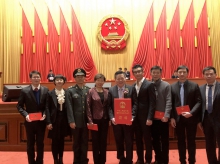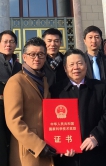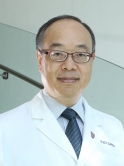Two CUHK Research Projects Receive State Science and Technology Awards
The 2017 State Science and Technology Awards ceremony was held at the Great Hall of the People in Beijing recently. Two collaborative research projects participated in by The Chinese University of Hong Kong (CUHK), namely ‘Development and Promotion of Molecular Targeted Therapy for Lung Cancer Patients’, and ‘Innovative Strategy and Technology for the Prevention and Treatment of Stroke’, each received a State Scientific and Technological Progress Award (second-class).
Development and Promotion of Molecular Targeted Therapy for Lung Cancer Patients
Prof. Tony Shu Kam MOK, Li Shu Fan Medical Foundation Professor of Clinical Oncology and Chairman of the Department of Clinical Oncology at the Faculty of Medicine at CUHK, has been collaborating with Prof. Yi-Long WU and his team from Guangdong General Hospital at the Guangdong Academy of Medical Sciences in lung cancer researches since 1999, especially focusing on epidermal growth factor receptor (EGFR) mutation happening in patients with lung adenocarcinoma.
Over the years, they achieved a number of breakthroughs which include: inventing molecular mutation targeted therapy for lung cancer patients which helps extend the survival period from 10 months to 22 months, thus setting a new treatment model; realising that EGFR mutation will make cancer cells ‘evolve’ and create a new driver oncogene in patients, hence developing resistance to first-line targeted therapy; finding that, for patients whose cancer genes further mutate and develop resistance after first-line EGFR targeted therapy, a new treatment can double the progression-free survival when compared with standard chemotherapy.
With the success of these trials and developments, the team has helped define ‘personalised medicine’ for lung cancer in mainland China and the world. Their studies were used for the registration of multiple targeted drugs in mainland China, allowing thousands of patients to receive first-line EGFR targeted therapy drugs at low cost. All the mentioned studies have been published in world renowned journals including The New England Journal of Medicine and The Lancet Oncology.
Professor Mok remarked, ‘I have been closely working with Prof Yi-Long WU for nearly 20 years and made multiple breakthroughs in the treatment of lung cancers, finding new treatment paradigms of mutated lung cancers which have set new international guidelines and standards. The most valuable output from this long term collaboration with mainland China is not the National Award, but the great friendship we have built by helping and respecting each other. Our ultimate goal is to make advanced lung cancer no longer fatal, but a chronic disease which could be treated with drugs.’
The two professors have also founded the Lung Cancer Research Group in Asia and the Chinese Thoracic Oncology Group on the mainland, and are working on the development of biomarkers for detection of oncogene.
Innovative Strategy and Technology for the Prevention and Treatment of Stroke
Prof. Lawrence Ka Sing WONG, Clinical Professor (honorary) of the Department of Medicine and Therapeutics at the Faculty of Medicine at CUHK, in collaboration with the Third Military Medical University and Chongqing Medical University, has been working on the prevention and treatment of stroke for many years. His team works on the epidemiology, pathogenesis and treatment of intracranial atherosclerosis.
Ischemic stroke is one of the leading causes of adult disability in China, with a high risk of subsequent recurrence. Professor Wong first confirmed that intracranial atherosclerosis, which means narrowing of blood vessels in the brain, is the predominant stroke subtype in Chinese patients with stroke, based on his study at the Prince of Wales Hospital. His team’s study using microembolic signal monitoring has also established that dual antiplatelet therapy is more effective than aspirin alone in reducing microembolism in patients with Transient Ischemic Attack (TIA) and minor stroke. Based on the results of this study, subsequent studies have confirmed that dual antiplatelet is the best medical therapy for minor stroke.
Recently, Professor Wong and his team have moved on to investigate new treatments to improve the motor function of disabled patients after stroke. His team observed that external counterpulsation is able to enhance blood flow to the brain and might improve functional recovery after stroke. Transcranial magnetic stimulation is another innovative approach to help the recovery of motor function by rewiring the damaged pathway linking the brain to the body.
Professor Wong is very encouraged by the award. He is also confident that the development of stroke therapy will continue to improve through researches. He said, ‘It is noteworthy that there may be synergistic effects from combining both treatments; with one augmenting the blood flow to the brain and the other revitalising the circuit between the limbs and the brain. These new innovative treatments may offer hope to stroke patients who remain disabled even after the best medical and physical therapy.’




Search for Press Releases

Related Press Releases

Current Events













 Subscribe
to Rss Feed
Subscribe
to Rss Feed Print
Print previous
previous